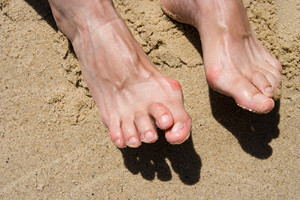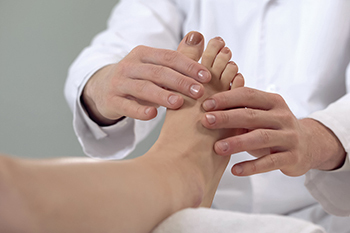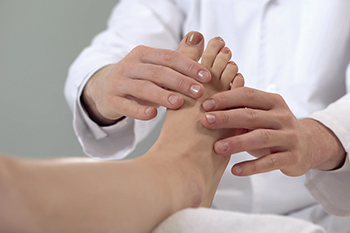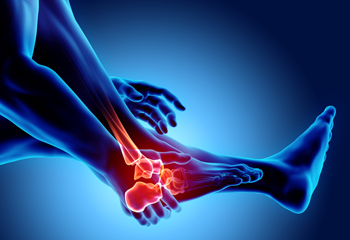September 2022
Which Toes Does Hammertoe Affect?

The foot condition known as hammertoe is unsightly and it’s considered to be a deformity. Hammertoe affects the middle joints in the second, third, or fourth toes and can cause the toes to bend downward, resembling a hammer. It happens as a result of a muscle imbalance which may occur due to genetic reasons or from wearing shoes that do not have adequate room for the toes to move freely in. The toes look crooked and may be reversed in mild cases. When the toe remains flexible, it may be straightened by pressing on the affected joint. In severe cases, the toes become rigid, and surgery is often necessary for permanent straightening. Some patients develop a hammertoe from stubbing their toe and this can push the tissues at the joint out of alignment. If you have developed a hammertoe, it is suggested that you consult a podiatrist for a proper diagnosis as well as treatment options that are best for you.
Hammertoes can be a painful condition to live with. For more information, contact Dr. Robert Graser of Graser Podiatry and Bunion Surgery Institute. Our doctor will answer any of your foot- and ankle-related questions.
Hammertoe
Hammertoe is a foot deformity that occurs due to an imbalance in the muscles, tendons, or ligaments that normally hold the toe straight. It can be caused by the type of shoes you wear, your foot structure, trauma, and certain disease processes.
Symptoms
- Painful and/or difficult toe movement
- Swelling
- Joint stiffness
- Calluses/Corns
- Physical deformity
Risk Factors
- Age – The risk of hammertoe increases with age
- Sex – Women are more likely to have hammertoe compared to men
- Toe Length – You are more likely to develop hammertoe if your second toe is longer than your big toe
- Certain Diseases – Arthritis and diabetes may make you more likely to develop hammertoe
Treatment
If you have hammertoe, you should change into a more comfortable shoe that provides enough room for your toes. Exercises such as picking up marbles may strengthen and stretch your toe muscles. Nevertheless, it is important to seek assistance from a podiatrist in order to determine the severity of your hammertoe and see which treatment option will work best for you.
If you have any questions, please feel free to contact our office located in Boerne, . We offer the newest diagnostic and treatment technologies for all your foot care needs.
Diabetes and Heel Fissures

Cracked heels, or heel fissures, are cracks or splits in the skin on the soles of the feet, often going through to the inner layers of skin. They can be painful when pressure is applied to the skin while standing, and they can bleed. This condition generally comes from dry skin. Loss of nerve supply to the sweat glands in the feet can happen to diabetics, because they tend to have drier skin than others. Heel fissures are common in the general population, but those with diabetes can have more serious consequences if they do not deal with cracked heels effectively. Diabetics can also suffer from neuropathy, causing loss of feeling in the feet. With the loss of sensation, patients with diabetes can have fissures that bleed and can possibly become infected and ulcerated without knowing it. If you are a diabetic, make sure to visually inspect your feet regularly. If you have cracked heels or some other foot problem, it is important for you to see a podiatrist for prompt treatment.
Diabetic foot care is important in preventing foot ailments such as ulcers. If you are suffering from diabetes or have any other concerns about your feet, contact Dr. Robert Graser from Graser Podiatry and Bunion Surgery Institute. Our doctor can provide the care you need to keep you pain-free and on your feet.
Diabetic Foot Care
Diabetes affects millions of people every year. The condition can damage blood vessels in many parts of the body, especially the feet. Because of this, taking care of your feet is essential if you have diabetes, and having a podiatrist help monitor your foot health is highly recommended.
The Importance of Caring for Your Feet
- Routinely inspect your feet for bruises or sores.
- Wear socks that fit your feet comfortably.
- Wear comfortable shoes that provide adequate support.
Patients with diabetes should have their doctor monitor their blood levels, as blood sugar levels play such a huge role in diabetic care. Monitoring these levels on a regular basis is highly advised.
It is always best to inform your healthcare professional of any concerns you may have regarding your feet, especially for diabetic patients. Early treatment and routine foot examinations are keys to maintaining proper health, especially because severe complications can arise if proper treatment is not applied.
If you have any questions please feel free to contact our office located in Boerne, . We offer the newest diagnostic and treatment technologies for all your foot and ankle needs.
People Who Have a Fear of Falling May Lose Interest in Exercising

The simple mishap of slipping on the floor or tripping on a rug can cause many injuries, including unwanted foot conditions. A fall may result in a broken foot or sprained ankle, and this may complicate daily living. Falling is a common occurrence among elderly people, and it may instill a fear of completing everyday activities. This fear of falling may lead to refraining from participating in an exercise program, which may cause the muscles to lose strength. There are several things that can cause falling to occur, in addition to simple methods that can be implemented which can help to prevent them. These can include scheduling regular physical and eye examinations that can update existing medications and eyeglasses, and removing frayed rugs from the living environments. Additionally, many seniors choose to have grab bars installed in the shower and toilet areas, and it can help to use a bathmat. If you would like more information about the importance of using effective fall prevention techniques, please schedule an appointment with a podiatrist who can answer any questions you may have.
Preventing falls among the elderly is very important. If you are older and have fallen or fear that you are prone to falling, consult with Dr. Robert Graser from Graser Podiatry and Bunion Surgery Institute. Our doctor will assess your condition and provide you with quality advice and care.
Every 11 seconds, an elderly American is being treated in an emergency room for a fall related injury. Falls are the leading cause of head and hip injuries for those 65 and older. Due to decreases in strength, balance, senses, and lack of awareness, elderly persons are very susceptible to falling. Thankfully, there are a number of things older persons can do to prevent falls.
How to Prevent Falls
Some effective methods that older persons can do to prevent falls include:
- Enrolling in strength and balance exercise program to increase balance and strength
- Periodically having your sight and hearing checked
- Discuss any medications you have with a doctor to see if it increases the risk of falling
- Clearing the house of falling hazards and installing devices like grab bars and railings
- Utilizing a walker or cane
- Wearing shoes that provide good support and cushioning
- Talking to family members about falling and increasing awareness
Falling can be a traumatic and embarrassing experience for elderly persons; this can make them less willing to leave the house, and less willing to talk to someone about their fears of falling. Doing such things, however, will increase the likelihood of tripping or losing one’s balance. Knowing the causes of falling and how to prevent them is the best way to mitigate the risk of serious injury.
If you have any questions, please feel free to contact our office located in Boerne, . We offer the newest diagnostic and treatment technologies for all your foot care needs.
The Feet Can Develop Various Forms of Arthritis

Arthritis is a painful condition that can affect the feet. There are several forms of arthritis and each one can develop in different parts of the foot. Osteoarthritis can cause bony spurs on the bottom of the big toe as a result of damaged cartilage. This can often lead to bunions developing and many patients have to purchase wider shoes. Inflammation of the joints in the ball of the foot may be indicative of rheumatoid arthritis. This may result in ligaments that become loose which may help the bone to push against the skin of the sole. Mild relief may be felt when a portion of leather is placed in the shoe, and this may be helpful in moving the pressure to the center of the foot. An extremely painful form of arthritis is known as gout and can develop from genetic reasons or from eating foods that have high levels of purines. These types of foods may cause excess uric acid and can lodge in the joints of the big toe. If you have foot pain, it is strongly advised that you consult with a podiatrist who can properly diagnose arthritis in the feet as well as offer treatment methods.
Arthritis can be a difficult condition to live with. If you are seeking treatment, contact Dr. Robert Graser from Graser Podiatry and Bunion Surgery Institute. Our doctor can provide the care you need to keep you pain-free and on your feet.
Arthritic Foot Care
Arthritis is a joint disorder that involves the inflammation of different joints in your body, such as those in your feet. Arthritis is often caused by a degenerative joint disease and causes mild to severe pain in all affected areas. In addition to this, swelling and stiffness in the affected joints can also be a common symptom of arthritis.
In many cases, wearing ill-fitting shoes can worsen the effects and pain of arthritis. Wearing shoes that have a lower heel and extra room can help your feet feel more comfortable. In cases of rheumatoid arthritis, the arch in your foot may become problematic. Buying shoes with proper arch support that contour to your feet can help immensely.
Alleviating Arthritic Pain
- Exercises that stretch the foot can prevent further pain and injury and increase mobility
- Most of the pain can be alleviated with anti-inflammatory drugs, heat, and topical medications
- Massages can help temporarily alleviate pain.
It is best to see your doctor for the treatment that is right for your needs and symptoms. Conditions vary, and a podiatrist can help you determine the right method of care for your feet.
If you have any questions, please feel free to contact our office located in Boerne, . We offer the newest diagnostic tools and technology to treat your foot and ankle needs.
Blog Archives
- July 2024
- June 2024
- May 2024
- April 2024
- March 2024
- February 2024
- January 2024
- December 2023
- November 2023
- October 2023
- September 2023
- August 2023
- July 2023
- June 2023
- May 2023
- April 2023
- March 2023
- February 2023
- January 2023
- December 2022
- November 2022
- October 2022
- September 2022
- August 2022
- July 2022
- June 2022
- May 2022
- April 2022
- March 2022
- February 2022
- January 2022
- December 2021
- November 2021
- October 2021
- September 2021
- August 2021
- July 2021
- June 2021
- May 2021
- April 2021
- March 2021
- February 2021
- January 2021
- December 2020
- November 2020
- October 2020
- September 2020
- August 2020
- July 2020
- June 2020
- May 2020
- April 2020
- March 2020
- February 2020
- January 2020
- December 2019
- November 2019
- October 2019
- September 2019
- August 2019
- July 2019
- June 2019
- May 2019
- April 2019
- March 2019
- February 2019
- January 2019
- December 2018
- November 2018
- October 2018
- September 2018
- August 2018
- July 2018
- June 2018
- May 2018









